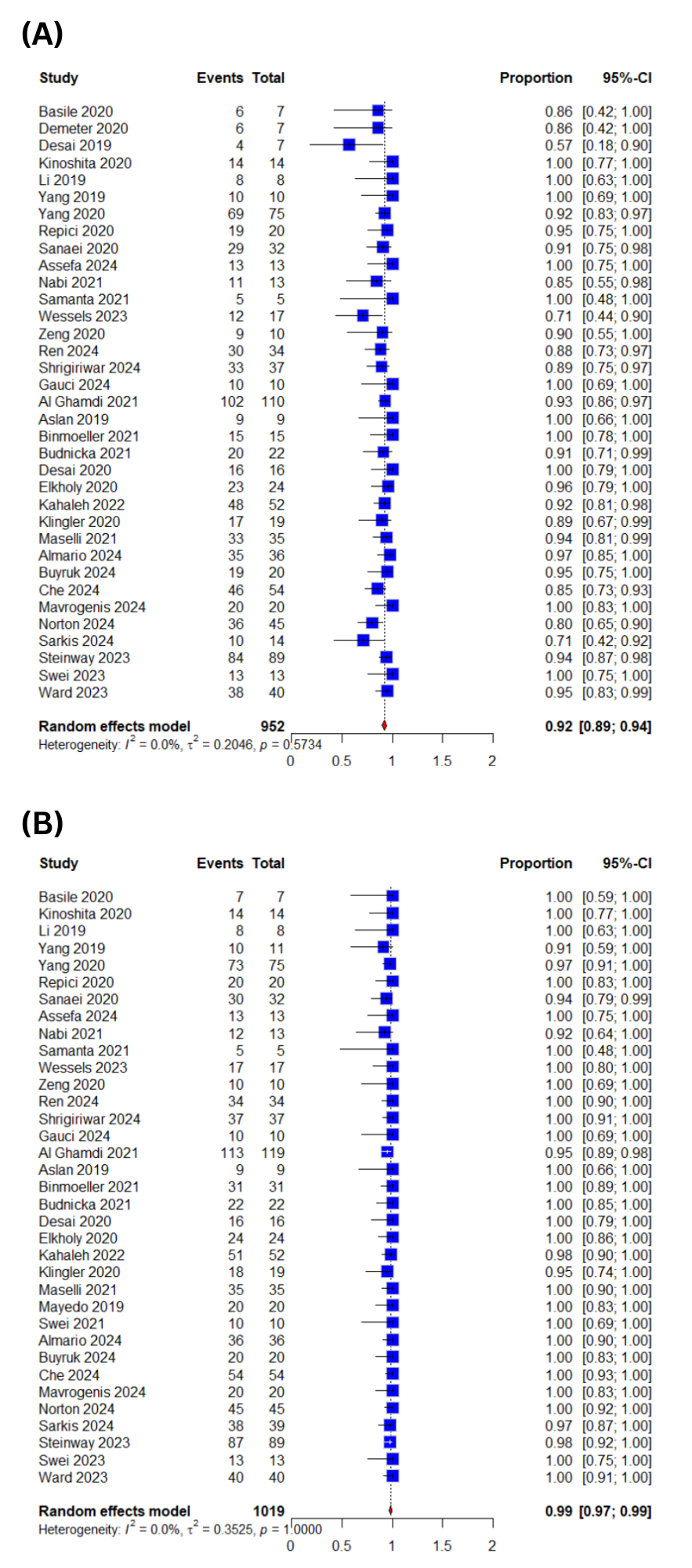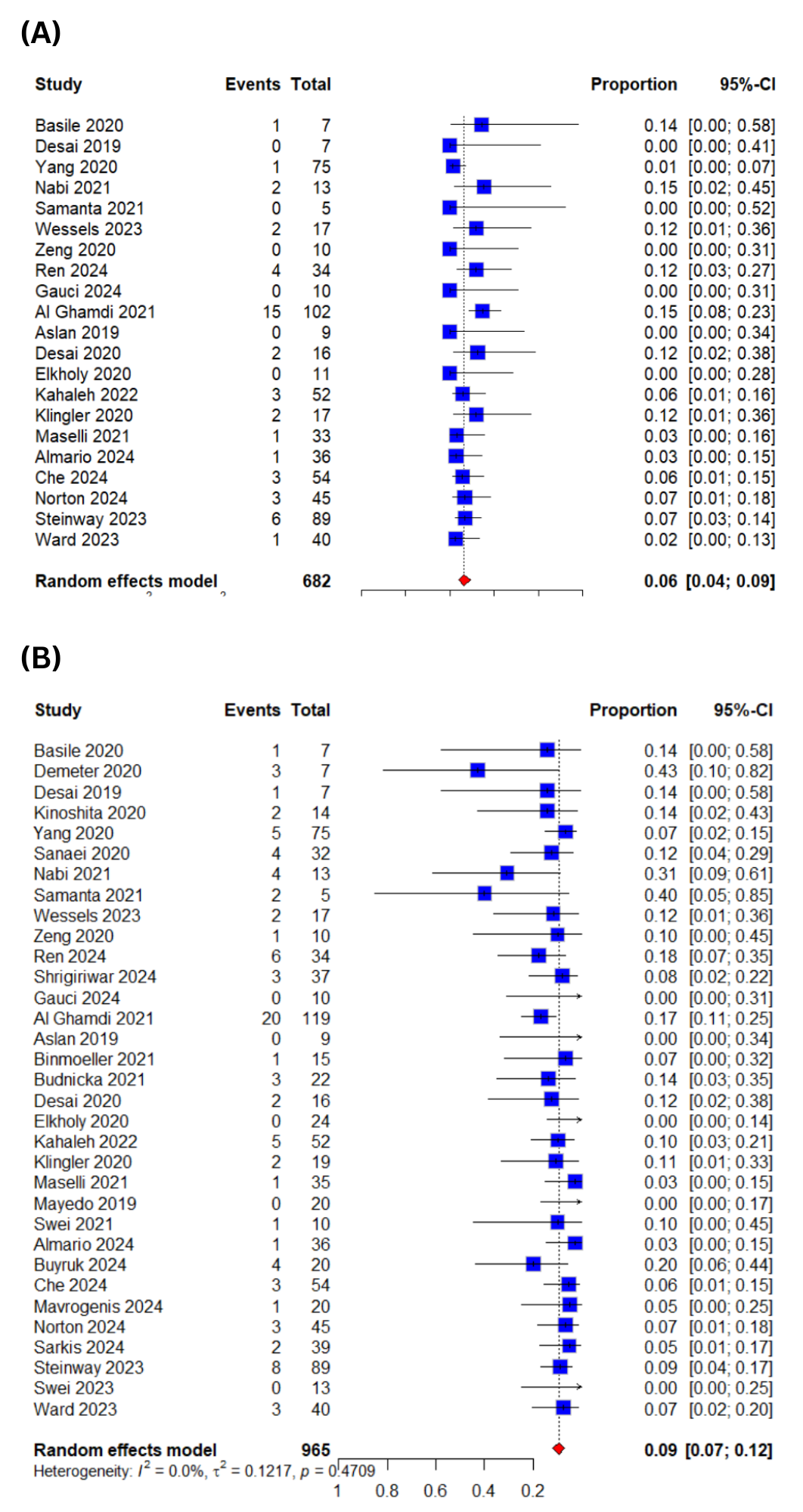Tuesday Poster Session
Category: Esophagus
P4932 - Efficacy and Safety of Peroral Endoscopic Myotomy for the Treatment of Esophageal Diverticula: A Systematic Review and Meta-Analysis
Tuesday, October 28, 2025
10:30 AM - 4:00 PM PDT
Location: Exhibit Hall

Khadija Mohib, MD (she/her/hers)
Kirk Kerkorian School of Medicine at the University of Nevada Las Vegas
Las Vegas, NV
Presenting Author(s)
Zain Ul Abideen, MBBS1, Muhammad Hassan Waseem, MBBS2, Khadija Mohib, MD3, Sania Aimen, MBBS4, Noor Ul Huda Ramzan, MD5, Abu-Bakr Ahmed, BA3, Mian Uman Anwer, MBBS6, Prasun K.. Jalal, MD7
1King Edward Medical University, Lahore, Punjab, Pakistan; 2Allama Iqbal Medical College, Lahore, Punjab, Pakistan; 3Kirk Kerkorian School of Medicine at the University of Nevada Las Vegas, Las Vegas, NV; 4Quetta Institute of Medical Sciences, Quetta, Balochistan, Pakistan; 5University of Texas Southwestern Medical Center, Dallas, TX; 6Punjab Medical College, Faisalabad, Punjab, Pakistan; 7Baylor College of Medicine, Houston, TX
Introduction: A new minimally invasive treatment, known as Per-oral Endoscopic Myotomy (POEM), has emerged for managing esophageal diverticula, including Zenker’s diverticulum, epiphrenic diverticulum, Killian–Jamieson diverticulum, and thoracic esophageal diverticulum. This meta-analysis aimed to assess the efficacy and safety of POEM for esophageal diverticula.
Methods: Electronic databases including PubMed, Cochrane Central and ScienceDirect were searched from inception till January 2025. This review followed the PRISMA (Preferred Reporting Items for Systematic Reviews and Meta-Analyses) guidelines. The pooled analysis was conducted under the random effects model using R version 4.2.3 and employing the “metaprop” package. The primary and secondary outcomes of interest were treatment success, technical success, symptoms recurrence, and adverse effects. The quality assessment was done through the Newcastle Ottawa Scale. The publication bias was assessed through visual inspection of funnel plots.
Results: Thirty-seven studies pooling a total of 1,032 patients were included in this meta-analysis. The pooled clinical success was 92% (95% confidence interval:[89-94%]; I2=0%). The technical success rate was 99% (95% CI:[97-99%]; I2=0%). The pooled rate of symptom recurrence was 6% (95% CI:[4-9%]; I2=0%) whereas the overall adverse effects were 9% (95%CI:[7-12%]; I2=0%).
Discussion: POEM demonstrates high clinical and technical success rates with low rates of symptom recurrence and adverse effects supporting its efficacy and safety for managing esophageal diverticula. These findings highlight POEM as a promising minimally invasive treatment option for diverse esophageal diverticula types.

Figure: Figure 1: Forest Plots for (A)Clinical Success (B)Technical Success

Figure: Figure 2: Forest Plots for (A)Symptom Recurrence (B)Adverse Events
Disclosures:
Zain Ul Abideen indicated no relevant financial relationships.
Muhammad Hassan Waseem indicated no relevant financial relationships.
Khadija Mohib indicated no relevant financial relationships.
Sania Aimen indicated no relevant financial relationships.
Noor Ul Huda Ramzan indicated no relevant financial relationships.
Abu-Bakr Ahmed indicated no relevant financial relationships.
Mian Uman Anwer indicated no relevant financial relationships.
Prasun Jalal: AbbVie – Consultant. Gilead Sciences – Consultant.
Zain Ul Abideen, MBBS1, Muhammad Hassan Waseem, MBBS2, Khadija Mohib, MD3, Sania Aimen, MBBS4, Noor Ul Huda Ramzan, MD5, Abu-Bakr Ahmed, BA3, Mian Uman Anwer, MBBS6, Prasun K.. Jalal, MD7. P4932 - Efficacy and Safety of Peroral Endoscopic Myotomy for the Treatment of Esophageal Diverticula: A Systematic Review and Meta-Analysis, ACG 2025 Annual Scientific Meeting Abstracts. Phoenix, AZ: American College of Gastroenterology.
1King Edward Medical University, Lahore, Punjab, Pakistan; 2Allama Iqbal Medical College, Lahore, Punjab, Pakistan; 3Kirk Kerkorian School of Medicine at the University of Nevada Las Vegas, Las Vegas, NV; 4Quetta Institute of Medical Sciences, Quetta, Balochistan, Pakistan; 5University of Texas Southwestern Medical Center, Dallas, TX; 6Punjab Medical College, Faisalabad, Punjab, Pakistan; 7Baylor College of Medicine, Houston, TX
Introduction: A new minimally invasive treatment, known as Per-oral Endoscopic Myotomy (POEM), has emerged for managing esophageal diverticula, including Zenker’s diverticulum, epiphrenic diverticulum, Killian–Jamieson diverticulum, and thoracic esophageal diverticulum. This meta-analysis aimed to assess the efficacy and safety of POEM for esophageal diverticula.
Methods: Electronic databases including PubMed, Cochrane Central and ScienceDirect were searched from inception till January 2025. This review followed the PRISMA (Preferred Reporting Items for Systematic Reviews and Meta-Analyses) guidelines. The pooled analysis was conducted under the random effects model using R version 4.2.3 and employing the “metaprop” package. The primary and secondary outcomes of interest were treatment success, technical success, symptoms recurrence, and adverse effects. The quality assessment was done through the Newcastle Ottawa Scale. The publication bias was assessed through visual inspection of funnel plots.
Results: Thirty-seven studies pooling a total of 1,032 patients were included in this meta-analysis. The pooled clinical success was 92% (95% confidence interval:[89-94%]; I2=0%). The technical success rate was 99% (95% CI:[97-99%]; I2=0%). The pooled rate of symptom recurrence was 6% (95% CI:[4-9%]; I2=0%) whereas the overall adverse effects were 9% (95%CI:[7-12%]; I2=0%).
Discussion: POEM demonstrates high clinical and technical success rates with low rates of symptom recurrence and adverse effects supporting its efficacy and safety for managing esophageal diverticula. These findings highlight POEM as a promising minimally invasive treatment option for diverse esophageal diverticula types.

Figure: Figure 1: Forest Plots for (A)Clinical Success (B)Technical Success

Figure: Figure 2: Forest Plots for (A)Symptom Recurrence (B)Adverse Events
Disclosures:
Zain Ul Abideen indicated no relevant financial relationships.
Muhammad Hassan Waseem indicated no relevant financial relationships.
Khadija Mohib indicated no relevant financial relationships.
Sania Aimen indicated no relevant financial relationships.
Noor Ul Huda Ramzan indicated no relevant financial relationships.
Abu-Bakr Ahmed indicated no relevant financial relationships.
Mian Uman Anwer indicated no relevant financial relationships.
Prasun Jalal: AbbVie – Consultant. Gilead Sciences – Consultant.
Zain Ul Abideen, MBBS1, Muhammad Hassan Waseem, MBBS2, Khadija Mohib, MD3, Sania Aimen, MBBS4, Noor Ul Huda Ramzan, MD5, Abu-Bakr Ahmed, BA3, Mian Uman Anwer, MBBS6, Prasun K.. Jalal, MD7. P4932 - Efficacy and Safety of Peroral Endoscopic Myotomy for the Treatment of Esophageal Diverticula: A Systematic Review and Meta-Analysis, ACG 2025 Annual Scientific Meeting Abstracts. Phoenix, AZ: American College of Gastroenterology.
